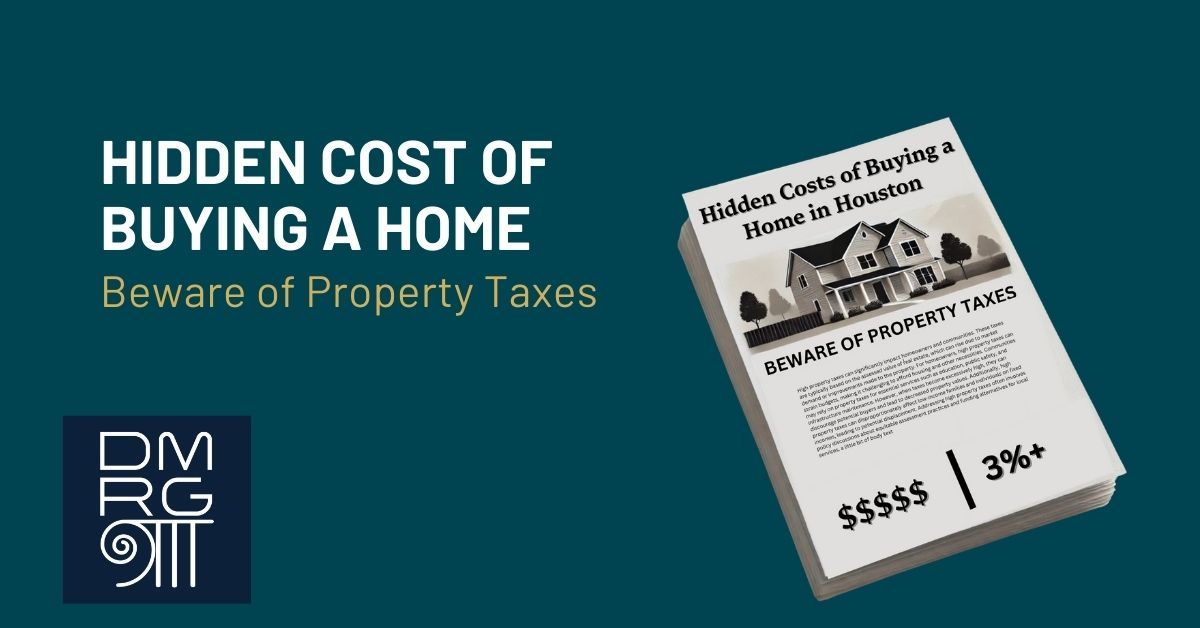Blog > Houston's Hidden Homeownership Cost: Things You Need to Know About Property Taxes!
Houston's Hidden Homeownership Cost: Things You Need to Know About Property Taxes!
by

Houston’s Hidden Homeownership Cost: Things You Need to Know About Property Taxes!
If you are considering purchasing a home in Houston, there is one expense you may have not considered – property taxes. You should know that while state income tax can offset property taxes in other cities, Texas has no state income tax but relies on property taxes to fund schools, infrastructure, and other social services. But here’s the kicker—Houston’s property tax rates are all over the map.
So, before you sign that line, let’s get into what you need to know about property taxes in Houston, how they are calculated, and how you can cut the cost.
🔸 What You Need to Know About Property Taxes in Houston
How Property Taxes Are Calculated
Have you ever thought about how property taxes are set? It’s really quite simple:
Property Tax = Assessed Property Value × Tax Rate
The county appraisal district determines your home’s assessed value, and the tax rate depends on your property's location. Houston's average property tax rate is about 2.3%, but it can be more or less, depending on the area.
Why Houston’s Property Taxes Are Higher Than Other Cities
Houston doesn’t have a state income tax, which is great—until you realize that property taxes are the chief source of funding for local schools, roads, and emergency services.
- Texas is 7th in the nation for highest property taxes!
- Some parts of Harris County have property taxes of more than 3%, one of the highest in the state.
The Role of Market Value and Appraisal Rates
The appraised value of your property is used to determine its taxable value and can rise as home values rise. In hot markets, home values rise fast, and that means your tax bill will, too, even if you don’t sell.
🔸 Houston Property Tax Rates by Area: What You Should Know
Master Planned Communities versus Traditional Neighborhoods
Are you thinking about purchasing a home in a master-planned community like Bridgeland or The Woodlands? They have amazing amenities, but the property tax rates are higher because of the additional infrastructure.
On the other hand, neighborhoods, as opposed to master-planned communities, may have lower tax rates but lack amenities.
Property Taxes in the Suburbs versus Houston City Limits.
- Within Houston: Tax rates are between 2.3% and 3%, but this includes city services.
- Suburbs (Katy, Sugar Land, Pearland): Taxes may be lower, but there could be additional special taxing districts.
MUD, PID, and TIRZ – Explained Simply
You may have heard of a MUD tax and if you haven’t, you might be in for a real treat.
- MUD (Municipal Utility District): This applies to new developments in which the builder includes infrastructure costs in the price of the homes that they sell.
- PID (Public Improvement District): Further tax assessments to pay for local enhancements.
- TIRZ (Tax Increment Reinvestment Zone): A tax incentive district that invests money back into the local economy for economic development.
If you are purchasing a home in a relatively new community, you can bet that there will be MUD taxes that can essentially double your tax rate in some instances.
🔸 Strategies to Reduce Your Property Taxes in Houston
Homestead Exemptions: How They Work
If you own the home and use it as your primary residence, you can claim a homestead exemption that can prevent up to $100,000 of the assessed value from being taxed and therefore lower your tax bill.
Protesting Your Property Appraisal
- Challenge your home’s appraised value if you think it is overinflated.
- 70% of homeowners who contest their property taxes succeed!
Deferrals and Exemptions for Seniors and Veterans: Tax
If you are 65 or older or a veteran, you may be able to claim extra exemptions or deferrals on your taxes, which will prevent you from paying property taxes until you sell the property.
🔸 Extra Costs: Other Expenses That You Will Find in Your Property Tax Statement
The “MUD” Tax and How It Impacts New Homeowners
As mentioned earlier, MUD taxes can significantly increase your tax rate—sometimes by 1% to 1.5% on top of your property tax base.
Unforeseen Special Assessments
Some areas incorporate one-time assessments for enhancements like sidewalks or drainage projects, which can cost hundreds (or even thousands) more.
Homeowners’ Association (HOA) Dues vs. Property Taxes
HOA fees differ from property taxes, but some areas require both, so it is important for homeowners to prepare for the additional expense.

